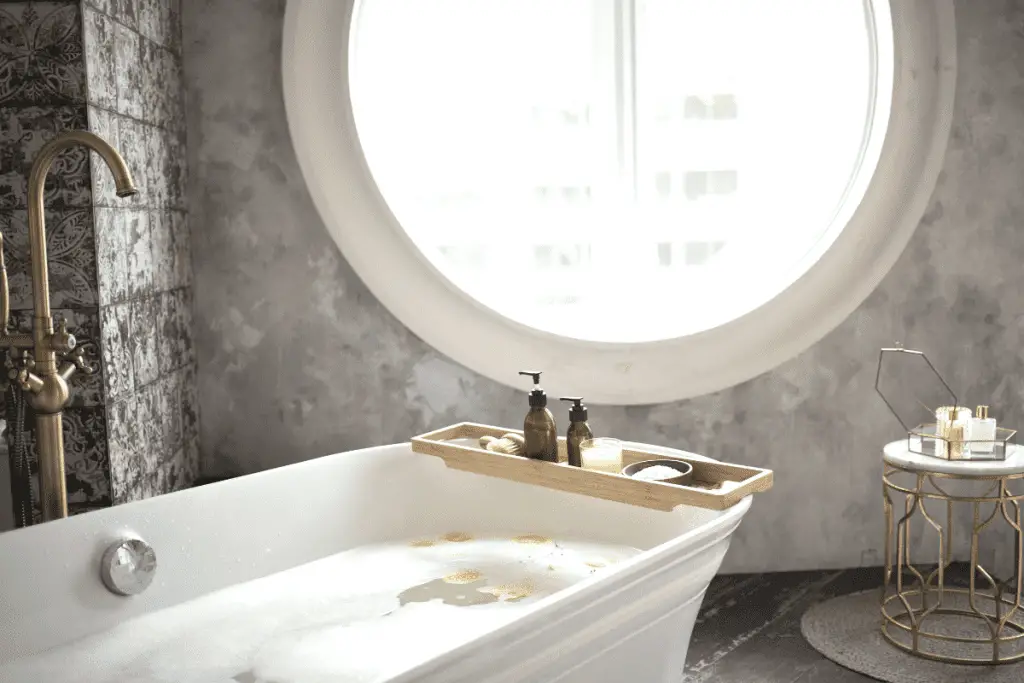You already have a shower head filter, and now you’re wondering if your bath water can also be filtered.
If your bathwater contains chlorine, you could use a Vitamin C powder or Vitamin C showerhead to filter it. Vitamin C reacts with chlorine and chloramines to neutralize both. If your bathwater contains heavy metals, impurities, chemicals, or toxins, the CuZn Bath Ball Faucet Filter cleanses your bathwater of these contaminants.
Both these options will ensure that your water quality issues that might be contributing to dry skin, brittle hair, and sinus irritation disappear.
Why You Should Filter Your Bath Water

Here’s why you might want to filter your bathwater:
1. Get Rid of Fine Lines and Wrinkles
A Vitamin C shower filter will neutralize chlorine before being converted into dehydroascorbic acid (DBA). The good news is that researchers have linked DBA to collagen synthesis. This is fantastic news given that collagen helps your skin stay youthful by keeping it free of any fine lines or wrinkles.
2. Save Your Hair from Getting Brittle
Researchers have found that chlorine causes chemical reactions in your hair and strips them of natural oil. Worse, it might also weaken your hair strands and cause split ends. Removing chlorine from your bathwater is thus essential if you have no intention of going bald anytime soon.
3. Protect Your Eyes from Damage
While bathing with water that has high levels of heavy metals doesn’t pose a health risk, you could end up damaging your eye if your bath water contains chlorine. Opticians warn that taking a bath with chlorine might damage your eyes’ tear film, making them vulnerable to infection.
4. Say Goodbye to Limescale Stains
Limescale, just like chlorine and chloramines, is a regular fixture in municipal water. You can check whether your bath water has limescale by inspecting your shower for stubborn white stains. Showering with filtered water will reduce those stains, making your bathroom much easier to clean.
5. Get Rid of Sinus Problems
Have you heard about swimmer’s sinusitis? It’s a type of sinus infection caused by chlorine entering the ears and nose. Early symptoms of this problem include irritation and swelling around the nose. Showering with filtered water will thus help you steer well clear of the swimmer’s sinusitis.
How To Filter Bath Water
There are various ways you can filter bathwater. Here are the best options:
- Use Vitamin C Powder: Vitamin C is available on the market in two forms: Ascorbic Acid and Sodium Ascorbate. Just a single teaspoon of either will be enough to dechlorinate a whole tub of water. Make sure you give the Vitamin C powder at least 5 minutes to work in magic before getting in the bath.
- Use Bentonite Clay: Healy clays such as Bentonite Clay are famous for binding to heavy metals in the body and exfoliating them. They can do the same thing when added to water, which is why many people add Bentonite clay to their baths for detoxing. Click here to know more about how you can take a detox bath with Bentonite clay.
- Use A Bath Dechlorinator: This handy gadget needs to be put into a bathtub for around 7 to 10 filaments for its internal filament to convert the chlorine in your bathwater into chloride, a harmless compound. It lasts for up to 200 baths and can be taken around on your travels. What more can you ask for!
- Use A Shower Dechlorinator: My favorite shower dechlorinator doesn’t settle at removing chlorine from your bathwater. Instead, it also eliminates sediments and balances the water’s pH level. And the best thing about it? It fits any standard shower arm. Plus, you can easily install it on your own.
- Use A Shower Filter: Bath and shower dechlorinators will come in handy if there’s nothing in your bath water besides chlorine. However, if you suspect the presence of heavy metals, fluorides, and other toxins, you need a multiple-stage shower filter to protect your skin, hair, and eyes from irritation and damage.
Frequently Asked Questions
What is the best filter for bath water?
The CuZn Bath Ball Faucet filter is one of the best for bath water. This 5-stage reverse osmosis unit has KDF filter media to remove heavy metals, chlorine, fluorides, sediments and other impurities from your bath water, and it doesn’t act against the benficial naturally occurring minerals.
Should babies and children be bathed with filtered water?
Bathing babies and children with filtered water is best because pure and soft water soothes and relaxes your child. It won’t dry out their skin or make their hair brittle. That isn’t the case with untreated or poorly treated water that might disturb your little one’s eyes, hairs and skin.
How often do you need to replace shower filter?
Most shower filters require you to replace their cartridge or filter element after processing 200 gallons of untreated or poorly treated water. Check out the user manual – or specifications sheet – of your shower filter to get a more definite answer to this question.
Should pets be bathed with filtered water?
Bathing your pets with filtered water can help them in many ways. Filtered water might remove dirt, dander and things like that from your pet’s coat. Filered water can also keep your pet’s coat free of fungus, dirt and odors throughout the year.
Keep in mind, though, that pets don’t need to bathe as often as humans. Cats could do with a bath every 4 to 6 weeks and dogs can be bathed every 1 to 2 months.
Conclusion
You might need to filter your bathwater if it contains chlorine, heavy metals, chemicals, or other toxins. Doing so will protect you from skin itching, brittle hair, red eyes, and sinus problems.

I graduated with a degree in Chemical Engineering and have written for a number of nationally recognized publications in the home improvement space. My skills include fluid mechanics and process engineering and I have worked on numerous projects, including in waste water flow rate calculation and heat balance of steam rollers in the paper industry. My goal as a technical writer is to make complicated topics easy to understand for the average person.
